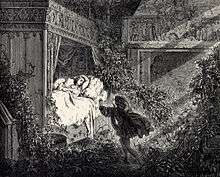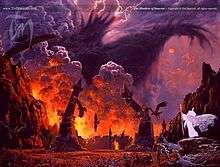Eucatastrophe
A eucatastrophe is a sudden turn of events at the end of a story which ensures that the protagonist does not meet some terrible, impending, and very plausible and probable doom.[1] The writer J. R. R. Tolkien coined the word by affixing the Greek prefix eu, meaning good, to catastrophe, the word traditionally used in classically inspired literary criticism to refer to the "unraveling" or conclusion of a drama's plot. For Tolkien, the term appears to have had a thematic meaning that went beyond its literal etymological meaning in terms of form.[2] In his definition as outlined in his 1947 essay "On Fairy-Stories",[3] eucatastrophe is a fundamental part of his conception of mythopoeia. Though Tolkien's interest is in myth, it is also connected to the gospel; Tolkien calls the Incarnation of Christ the eucatastrophe of "human history" and the Resurrection the eucatastrophe of the Incarnation.[4]

Eucatastrophe has been labelled by some as a form of deus ex machina, due to both sharing an impossible problem being suddenly resolved.[5][6] However, differences between the two have also been noted, such as its inherent connection to an optimistic view on the unfolding of events in the narrative of the world.[7] In Tolkien's view, eucatastrophe can also occur without the use of a deus ex machina.[8]
Examples in Tolkien's work

The best-known and most fully realized eucatastrophe in Tolkien's work occurs in the climax of The Lord of the Rings. Though victory seems assured for Sauron, the One Ring is permanently destroyed as a result of Gollum's waylaying of Frodo at Mount Doom.[9] Frodo essentially fails his impossible quest at its very end, claiming the Ring for himself – however, at this moment, Gollum suddenly appears, steals the ring, and in his ecstatic gloating falls into the fire. If not for Frodo's previous mercy in sparing Gollum's life (a great risk due to Gollum's obvious treachery, met with bitter protest by Sam), and if not for the Ring’s own corruptive influence on Gollum, Sauron would surely have reclaimed it. Thus, Evil is inadvertently and unforeseeably defeated through a small act of kindness and through its own corruptive machinations.
Another example of eucatastrophe is the recurring role of the eagles as unexpected rescuers throughout Tolkien's writing. Tolkien described Bilbo's "'eucatastrophic emotion" at the eagles' appearance in The Hobbit as one of the key moments of the book.[10]
See also
References
Inline citations
- Mazur 2011, p. 174
- Greek eu = "good", kata = "down", strephein = "to turn or rotate"
- Tolkien 1990, pp. 109–161
- Tolkien 1990, p. 156
- Westfahl, Gary (2005). The Greenwood Encyclopedia of Science Fiction and Fantasy: Themes, Works, and Wonders. 1. Greenwood Publishing Group. p. 195. ISBN 978-0-313-32951-7.
- Hart, Trevor (2013). Between the Image and the Word. Ashgate Publishing, Ltd. ISBN 978-1-4724-1370-3. Retrieved 7 September 2014.
- Mazur 2011, p. 175
- Magill, Frank (1983). Survey of modern fantasy literature (First ed.). Salem Press. p. 2065. ISBN 978-0893564506. Retrieved 8 September 2014.
- Solopova, Elizabeth (2009), Languages, Myths and History: An Introduction to the Linguistic and Literary Background of J.R.R. Tolkien's Fiction, New York City: North Landing Books, p. 29, ISBN 0-9816607-1-1
- Carpenter, Humphrey, ed. (1981), The Letters of J. R. R. Tolkien, Boston: Houghton Mifflin, Letter No. 89, ISBN 0-395-31555-7
General references
- Mazur, Eric Michael, ed. (2011). Encyclopedia of Religion and Film. ABC-CLIO. ISBN 0313013985.
- Tolkien, J.R.R. (1990). The Monsters and the Critics and Other Essays. London: HarperCollinsPublishers. ISBN 0-261-10263-X.
| Look up eucatastrophe in Wiktionary, the free dictionary. |